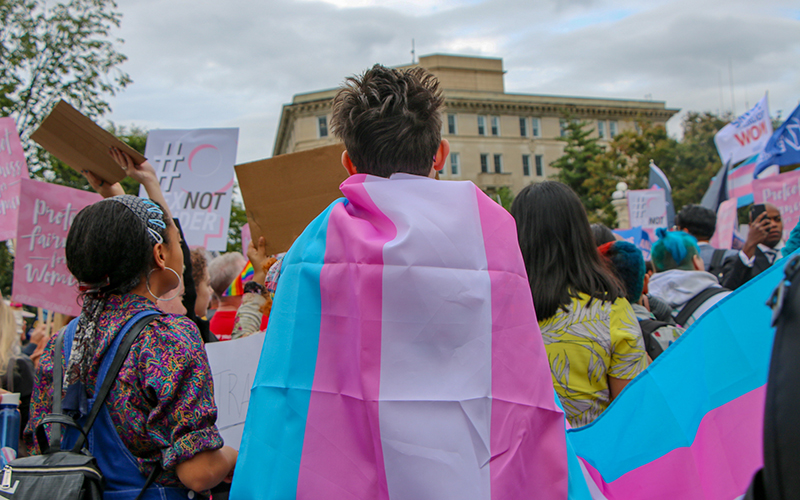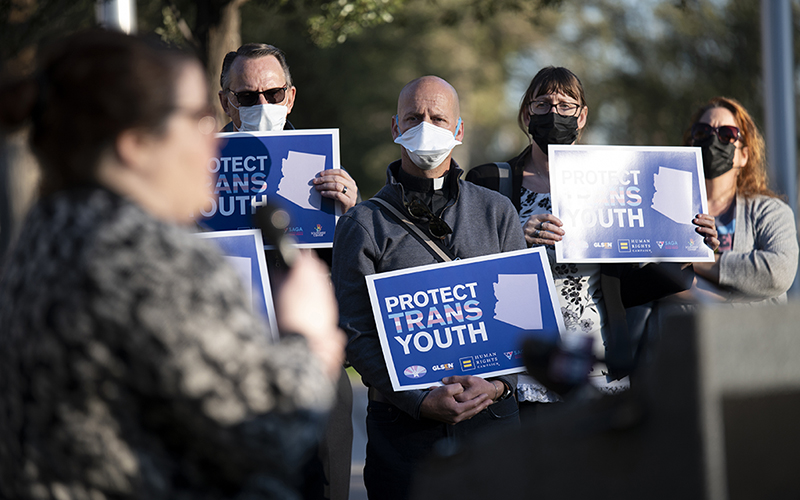WASHINGTON – A federal appeals court has refused to order Arizona’s Medicaid program to pay for the transition surgery of a transgender teen who claimed the state’s failure to do so amounted to sex discrimination.
The 9th U.S. Circuit Court of Appeals ruling upheld a lower court that said the 15-year-old had not shown that male chest reconstruction surgery was “medically necessary,” and noting that the Arizona Health Care Cost Containment System does pay for gender dysphoria counseling and hormone therapy.
But the appeals court did not rule on whether the AHCCCS policy violates the civil rights of the teen, identified as John Doe, giving advocates hope that the district court will uphold Doe’s constitutional right to federal health care when the case returns to the lower court.
“There’s a large, significant body of research that demonstrates that transgender youth who received gender-affirming health care … have shown decreased anxiety, depression, suicidal behavior and psychological distress,” said D. Ojeda, a senior national organizer for the National Center for Transgender Equity.
Ojeda called it a “slap in the face” for the court to say the procedure is not medically necessary, saying opponents continue “to harp on science when they’re not even looking at the science.”
But Vernadette Broyles, an attorney for the Child and Parental Rights Campaign, which filed a friend of the court brief in support of AHCCCS, said it is important to consider the effects of gender-affirming treatments on kids who are still developing.
“We have never done the kind of rigorous clinical study that is needed to know … without a doubt that they are safe and effective,” Broyles said. “It is not unreasonable for states to want to step in and protect their children.”
Attorneys for AHCCCS did not respond to requests for comment Monday. Doe’s attorney, Asaf Orr, said that although the court denied the request for immediate coverage of the surgery, he is “pleased” that the judges rejected the district court’s application of two civil rights laws.
The ruling comes as bills aimed at transgender kids are moving through the Arizona Legislature, including a bill that would prohibit gender-confirmation treatments for minors.
The Doe case began when AHCCCS refused to cover a male chest reconstructive surgery for Doe and another teen, identified as D.H., who were assigned female at birth, according to court documents. State law excludes such surgeries from Medicaid coverage.
The teens sued in August 2020. They claimed the exclusion discriminated against them under the Affordable Care Act, which prohibits denial of care based on sex, and under a 2020 Supreme Court case, known as Bostock, that extended laws against sex discrimination in employment to include gay and transgender workers.
In their suit, the teens asked the court to order the state to pay for the surgery they said they “urgently need … to alleviate their gender dysphoria,” citing “broad consensus … that the surgery is a safe, effective, and medically necessary treatment” for many, including adolescents.
But the district court disagreed, noting the gender dysphoria care AHCCCS can pay for and saying the teens had not proved they would be irreparably harmed if it did not order the state to cover the surgery immediately.
District Judge Scott H. Rash also rejected the teen’s claim that the ruling in Bostock applies. He said the Supreme Court limited the scope of Bostock to employment discrimination under Title VII, not a “state Medicaid plan exclusion for surgical treatment of gender dysphoria in minors.”
The appeals court upheld the ruling, agreeing with Rash that the teens had not made their case. But the opinion by Circuit Judge Consuelo M. Callahan also said the lower court’s application of Bostock was too narrow.
While Bostock dealt with Title VII discrimination, its definition of “discrimination because of sex” also applies to Title IX and the ACA and protects people from being denied access to any taxpayer-funded “‘health program or activity,’” including Medicaid, Callahan wrote.
Broyles said she thinks the appellate court’s interpretation of Title VII is inconsistent with the Supreme Court’s intention.
“Justice (Neil) Gorsuch stated … ‘We are not considering other rights … we are strictly confining our decision to Title VII,’” Broyles said. “So I think that’s just going to have to be briefed some more and looked at again.”
But Ojeda thinks the government should stay out of the health care decisions between providers, parents and transgender kids, and expressed confidence that federal law like the ACA and Title VII will protect those rights.
“The federal government is definitely on the side of trans kids and trans people overall, who need access to gender-affirming care,” Ojeda said. “The law eventually is going to protect trans youth.”



